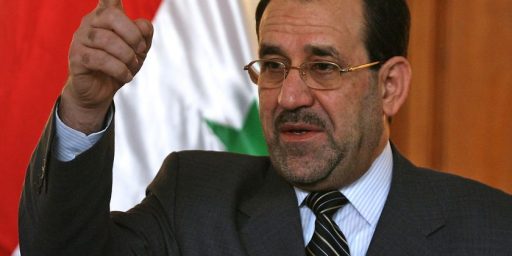Iraq: Democracy Versus Security
Reuel Marc Gerecht, a former Central Intelligence Agency officer and respected analyst on the Middle East, has a provocative column in today’s Arizona Republic entitled, “For liberty to work, Iraqis must be integral to their government.” My first thought upon reading the title was, “Well, no $&#*. This must be why it’s in the Arizona Republic and not a major paper.” But, remembering that authors seldom write their own headlines, I pressed on.
With the transfer of formal sovereignty to Iraq’s leaders, the Bush administration has hung its hopes, and probably the president’s chances for re-election, on two propositions. The first is that Iraq’s Sunni Arabs will be less inclined to allow, much less support, the insurrection if they can envision the end of the occupation. The second is that Prime Minister Iyad Allawi is an Arab Shiite whom both Sunnis and Shiites will follow. Both assumptions are basically sound. Yet Allawi, like his American predecessors, risks alienating his constituency by emphasizing security over democracy. He should not let his efforts to rebuild the armed forces obscure the larger goal of giving Iraqis a stake in their government.
***
Public opinion polls are often unreliable barometers of popular sentiment in the Muslim Middle East, especially in lands with authoritarian traditions. But a recent poll of Iraqis suggests there is a desire for greater control of their own destiny among both Sunni and Shiite Arabs. The Kurds, the critical third element in the country’s population, have been relatively autonomous for more than a decade.
Iraqis will give the benefit of the doubt to the new government; it is theirs, even if it is unelected. They certainly view their new leaders more kindly than their predecessors, the members of the Iraqi Governing Council, which could rarely escape the writ of America’s envoy, L. Paul Bremer.
War fatigue is also evident among both the Sunnis and the Shiites. Most people on both sides want the interim government to win its battle against former Baathists and violent Sunni fundamentalists who have run roughshod over traditional leaders and customs. The Kurds, too, would undoubtedly prefer to see Iraqi Arab political disputes not resolved through the use of force.
It may well be that Allawi’s focus on security is appropriate, at least in the very short term. It certainly reflects the priorities of the Bush administration, which will bear no small responsibility for his success or failure. But it is also possible that these priorities are needlessly skewed.
After all, Americans and Iraqis have already shown that democracy – at least on a local level – can grow amid considerable physical insecurity. Mosul, where scores of people were killed last week by car bombs, has a vibrant city council and a local police force.
John D. Negroponte, the new American ambassador in Baghdad, should impress on Allawi the importance of advancing national elections, not on reincorporating the old Sunni military elite into a new army. Engaging the citizenry in the political process is the best way to bring lasting security and harmony to Iraq.
Given that the primary surviving rationale for the war effort–and certainly for the costly post-war rebuilding effort–is democratization of Iraq, Gerecht is certainly correct about the fundamental nature of working to that end. Unfortunately, a fundamental truth of politics is that there is an inherent trade-off between liberty and security. Security is the first order of business; it’s why governments are established. The measures necessary in cracking down on an insurgency are almost necessarily un-democratic. On the flip side, democracy without some reasonable level of security is rather worthless; it’s essentially anarchy.
The U.S. can certainly provide incentives on the diplomatic, economic, and military fronts. But it’s up to the Iraqis to make it happen. Ultimately, we’re going to have to hope that internal pressures from Kurds, Sunnis, and other minorities mitigate toward democracy in Iraq.




